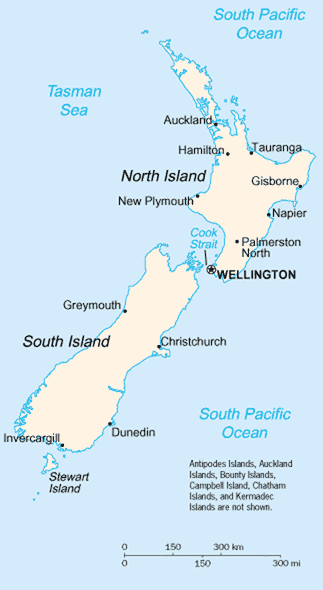In this economic guide to New Zealand we’ll give you an overview of this island nation’s economy, including the country’s primary imports and exports of goods and services.
Contents
Economy of New Zealand – Overview
New Zealand currently ranks as the 58th largest product export economy in the world with annual exports totaling $40.1 billion and imports of $40.9 billion, resulting in a negative trade balance of $817 million.
The yearly value of New Zealand’s exports has fallen over the last five years by 39.6 million.

New Zealand’s GDP
New Zealand’s GDP is $205 billion (ranked 51st in the world) and its GDP per capita is $41,945, which makes it 24th globally on a per capita basis.
The island country has seen 53.8% growth in its GDP since 2008.
New Zealand’s Top 5 Commodity Exports
- Concentrated Milk – $5 billion
- Sheep and Goat Meat – $2.7 billion
- Butter – $2.6 billion
- Rough Wood – $2.5 billion
- Frozen Bovine Meat – $1.9 billion
New Zealand’s Other Notable Exports
- Other Fruits – $1.6 billion
- Cheese – $1.3 billion
- Wine – $1.2 billion
- Malt Extract – $1.1 billion
- Raw Aluminum – $736 million
The top export destinations of New Zealand are China ($9.75 billion), Australia ($6.17 billion), United States ($3.82 billion), Japan ($2.43 billion), and South Korea ($1.25 billion).
New Zealand’s Top 5 Commodity Imports
- Crude Petroleum – $2.5 billion
- Refined Petroleum – $2.1 billion
- Aluminium Oxide – $296 million
- Rubber Tires – $256 million
- Iron Structures – $162 million
New Zealand’s Other Notable Imports
- Cars – $3.3 billion
- Delivery Trucks – $1.3 billion1
- Broadcasting Equipment – $954 million
- Gas Turbines – $897 million
- Planes, Helicopters, and/or Spacecraft – $866 million
Top countries that import to New Zealand include China ($7.42 billion), Australia ($5.75 billion), United States ($3.61 billion), Japan ($2.7 billion), and Singapore ($1.95 billion).
Details About New Zealand’s Imports/Exports
Here’s a bit more detail on some of New Zealand’s biggest commodity imports and exports.
Concentrated Milk
Exports of concentrated milk account for 12.7% of the country’s total annual exports and New Zealand is the world’s biggest exporter with a 26.2% share of a global market that is worth $19.4 billion per year.
New Zealand exports almost triple the amount of concentrated milk than any other country. Its nearest rival is the Netherlands which has a 9.1% market share, followed by the USA, which controls 7.75% of the global export market, closely followed by Germany with 7.02%.
Sheep and Goat Meat
Sheep and goat meat exports are the second largest export market of New Zealand and account for 12.7% of its total annual exports.
Australia and New Zealand compete for the prime position in this global export market, which is worth $7.94 billion annually. Australia controls 35.6% of the market, followed by New Zealand on 33.7%, with China in third place with 16.8%.
Frozen Bovine Meat
Exports of frozen bovine meat represent 4.7% of New Zealand’s total annual exports and the country is the fifth largest exporting country with an 8.3% share of a global market worth $1.9 billion each year.
The United States is a key export destination for New Zealand’s exports of frozen bovine meat and it imports 43.4% of these exports, followed by China, who accounts for 27.5% of the total exported.
Raw Aluminum
The global export market for raw aluminum is worth $61.1 billion and New Zealand is ranked 20th on the list of exporters. The country exports $736 million each year.
Exports of raw aluminum represent 1.84% of the country’s total annual exports.
Japan is a primary destination for New Zealand’s aluminum exports and receives 61.8% of its annual shipments.
Interesting Facts About New Zealand
- New Zealand is one of the least populated countries in the world, despite being the equivalent size to Japan.
- The country has 2.5 million cars registered for a total population of just over 4 million, making its car ownership rate one of the highest in the world.
- New Zealand has won more Olympic gold medals per capita than any other country.
- There are no snakes in the wild in New Zealand.
All figures based on OEC/IMF 2018 calculations and projections unless otherwise stated.
Regulated Brokers: Where Can I Trade Commodities?
Start your research with reviews of these regulated brokers available in .
CFDs are complex instruments and come with a high risk of losing money rapidly due to leverage. Between 74%-89% of retail investor accounts lose money when trading CFDs. You should consider whether you can afford to take the high risk of losing your money.
Further Reading
- Commodity.com Guide to Commodity Brokers
- Commodity.com Guide to CFD Brokers
- Guide to Trading Soft Agricultural Commodities
- Wool Trading Guide


